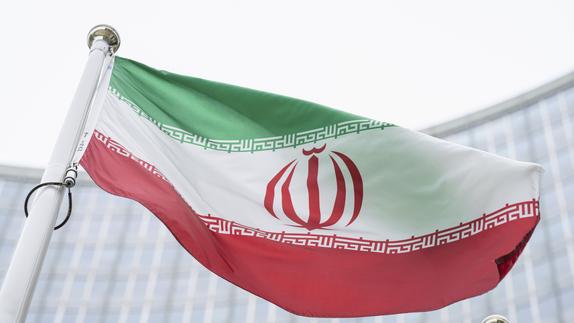 In this May 24, 2021 file photo, the flag of Iran waves in front of the International Center building with the headquarters of the International Atomic Energy Agency, IAEA, in Vienna, Austria. (FLORIAN SCHROETTER / AP)
In this May 24, 2021 file photo, the flag of Iran waves in front of the International Center building with the headquarters of the International Atomic Energy Agency, IAEA, in Vienna, Austria. (FLORIAN SCHROETTER / AP)
As Iran and other parties to the 2015 nuclear deal inch closer to reviving the agreement the United States ditched in 2018, all signatories should help ensure the deal’s economic and political guarantees to avoid a repeat of Washington’s irresponsible behaviour, say experts.
Seyed Mostafa Khoshcheshm, a senior Iran affairs analyst, said given the negative impact the Ukraine-Russian war has had on the world economy, Europe and the US, who are facing energy supply problems and rising energy prices, “cannot tolerate the economic, political and security impact” of defying the Iranian demands.
They (the US) withdrew from the JCPOA irresponsibly. Iran stood under the deal for 14 months after the US left and the Europeans promised they wanted to make up for the US’ lost part, but they never did that.
Seyed Mostafa Khoshcheshm, senior Iran affairs analyst
“They (the US) withdrew from the JCPOA irresponsibly. Iran stood under the deal for 14 months after the US left and the Europeans promised they wanted to make up for the US’ lost part, but they never did that,” said Khoshcheshm, who also taught at the Faculty of International Relations of the Iranian Foreign Ministry and is editor-in-chief of Iran’s Fars News Agency.
READ MORE: EU proposes 'final text' for reviving Iran nuclear deal
On Aug 8, the European Union foreign policy chief Josep Borrell put forward a "final text" of the draft decision on reviving the Joint Comprehensive Plan of Action, JCPOA. The move came at the end of talks which began in the Austrian capital of Vienna in April last year.
The EU proposal has not been made public, but a tweet by London-based TV station Iran International on Aug 19, citing sources as saying that it included the removal of sanctions on a number of banks and sanctions relief for about 150 institutions, the immediate release of $7 billion worth of Iranian assets overseas, and an exemption for foreign companies from sanctions in case of US withdrawal.
On Aug 22, Aljazeera reported that Borrell said Iran had given a “reasonable” response to the proposal and that it was transmitted to the US, which has not yet responded formally. He was also quoted as saying that the world would be a much safer place “if we can make this agreement work”.
Manjari Singh, an associate fellow at the Centre for Land Warfare Studies in New Delhi, said that the EU brokered proposal “is the farthest level wherein both US and Iran have come to terms with each other”.
She said while it is being speculated that the aim of the “P5+1”, or other parties to the deal, namely China, France, Russia, the UK and the US plus Germany, was to contain Iran’s nuclear program and to avoid a nuclear weapons crisis in the Middle East, the West seems to have realised that the best tactic could be through signing the deal with Iran.
“Resource-starved Iran would be compelled to look at options far beyond (the) US’ reach and that could endanger the peace and stability in the region, therefore, the best option to control Iran is to sign the deal,” Singh said.
Iran signed the JCPOA with world powers in July 2015, agreeing to curb its nuclear program in return for the removal of sanctions on the country.
ALSO READ: Iran's committee: Nuclear talks must lead to US sanctions removal
However, former US President Donald Trump pulled Washington out of the agreement and reimposed unilateral sanctions on Teheran, prompting the latter to drop some of its commitments under the pact.
Singh said another reason for the West to quickly sign the deal is that they do not want to be involved in another escalation after the Russia-Ukraine conflict.
“Therefore, to avoid any such mishappening, signing the deal with Iran serves their purpose,” she said.
Iran’s Foreign Ministry spokesperson Nasser Kanaani said on Aug 22 that Iran has not yet received a US response. He also blamed the US for the status quo of the nuclear deal and said that the talks would move to the next stage if the US proved in practice that it has the political will to reach and keep to an agreement.
“There are many unanswered questions and that the most pertinent one remains is will the upcoming US administrations abide by the terms and conditions agreed upon if the deal is finally signed? The US solution to this does not seem very promising as it remains legally unbinding and only ensures that in such likelihood the US administration will have to pay a fine. This does not seem very promising,” said Singh.
Khoshcheshm said Iran’s “negotiators are in no rush” as they are seeking a good deal.
“The only thing we would agree is a good deal. And we are waiting to see the final American response. Sooner or later, they will have to provide us with their view point very publicly and in the open,” said the analyst.
Xinhua contributed to this report.


